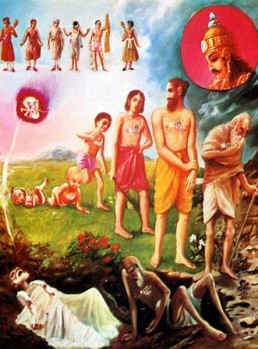Swami Chinmayananda Commentary
As used here, Kshatriya is not the name of a caste. It merely indicates a certain quality of the mental vasanas in the individual. Those who have an ever-bubbling enthusiasm to defend the weak and the poor, besides their own national culture from all threats of aggression, are called Kshatriyas. Such leaders of men are not allowed to be tyrants and aggressors themselves, according to the code of morality of the Hindus. But, at the same time, a cold, feminine and cowardly non-resistance is not the spirit of the Hindu tradition. In all cases where the Hindu nation is forced to wage a war on principles of righteousness (Upapannam) the leaders of India are ordered to fight in defence of their culture and to consider themselves fortunate to get the chance to serve the country. Such battle-fields are the wide-open gates to Heaven for the defending heroes who fight diligently on the side of Dharma.
It is interesting to note how Lord Krishna, in the scheme of his exhortations, comes down slowly from the highest pinnacles of Vedantic ideologies to the lower plane of material philosophy, and still lower down to the point-of-view of an average worldly man. From all these different levels, he views the problem and presents Arjuna with the same logical conclusion that the war must be fought.
IT IS INDEED A FACT THAT IT IS YOUR DUTY, AND NOW IN CASE YOU RENOUNCE IT AND RUN AWAY FROM THE BATTLE-FIELD, THEN:
Adi Sankara Commentary
Why, again, does that battle become a duty? This is being answered (as follows) [A specific rule is more authoritative than a general rule. Non-violence is a general rule enjoined by the scriptures, but the duty of fighting is a specific rule for a Ksatriya.]: Partha, O son of Partha; are not those Ksatiryas sukhinah, happy [Happy in this world as also in the other.] who labhante, come across; a yuddham, battle; idrsam, of this kind; upapannam, which presents itself; yadrcchaya, unsought for; and which is an apavrtam, open; svarga-dvaram, gate to heaven? [Rites and duties like sacrifices etc. yield their results after the lapse of some time. But the Ksatriyas go to heaven immediatley after dying in battle, because, unlike the minds of others, their minds remaind fully engaged in their immediate duty.]
The Bhagavad Gita with the commentary of Sri Sankaracharya – Translated by Alladi Mahadeva Sastry
Holy Geeta – Commentary by Swami Chinmayananda
The Bhagavad Gita by Eknath Easwaran – Best selling translation of the Bhagavad Gita
The Bhagavad Gita – Translation and Commentary by Swami Sivananda
Bhagavad Gita – Translation and Commentary by Bhaktivedanta Swami Prabupadha
Srimad Bhagavad Gita Chapter 2 – Verse 32 – 2.32 yadrichchhaya – All Bhagavad Gita (Geeta) Verses in Sanskrit, English, Transliteration, Word Meaning, Translation, Audio, Shankara Bhashya, Adi Sankaracharya Commentary and Links to Videos by Swami Chinmayananda and others – 2-32

